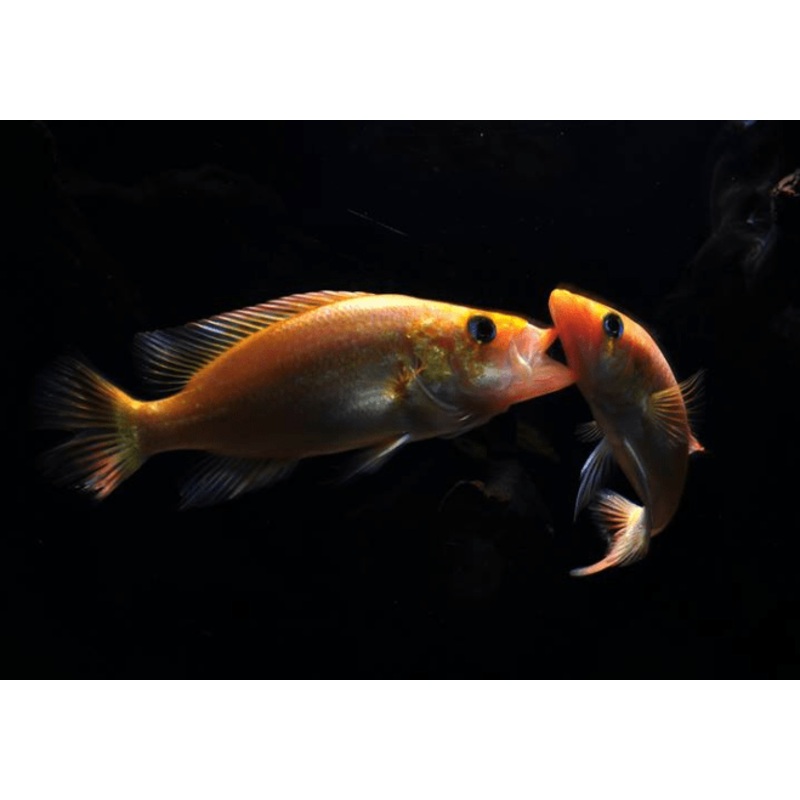 Sale!
Sale! The Red Bay Snook (Petenia splendida) is a captivating Central American cichlid, renowned for its vibrant red hues and distinctive body shape. At approximately 5 cm (2 inches) in size, this juvenile specimen promises to mature into a stunning centerpiece,
The Red Bay Snook (Petenia splendida) is a captivating Central American cichlid, renowned for its vibrant red hues and distinctive body shape. At approximately 5 cm (2 inches) in size, this juvenile specimen promises to mature into a stunning centerpiece, reaching lengths of up to 50 cm (20 inches). Native to the slow-moving rivers and lakes of Mexico, Guatemala, and Belize, the Red Bay Snook is both a visual delight and a fascinating species for dedicated aquarists.
Species: Petenia splendida
Common Name: Red Bay Snook
Current Size: 5 cm (2 inches)
Adult Size: Up to 50 cm (20 inches)
Lifespan: 510 years with proper care
Temperament: Moderately peaceful; can be territorial during breeding
Diet: Carnivorous; thrives on high-quality pellets, live or frozen foods like earthworms, shrimp, and krill
Water Parameters:
Temperature: 24C to 30C (75F to 86F)
pH Level: 7.0 to 7.5
Hardness: 10 to 20 DGH.
Striking Appearance: Its brilliant red coloration and unique body shape make it a standout addition to any large aquarium.
Interactive Behavior: Known for their intelligence, Red Bay Snooks often interact with their owners, recognizing feeding times and displaying unique behaviors.
Adaptability: Hardy and adaptable to a range of water conditions, making them suitable for experienced aquarists.
Longevity: With proper care, they offer years of companionship and entertainment.
Minimum Tank Size: 180 gallons (680 liters) for a single adult; larger tanks required for multiple specimens
Substrate: Soft sand or fine gravel to accommodate their digging behavior
Decor: Sturdy decorations like driftwood and rocks; avoid sharp edges and ensure items are securely placed
Filtration: High-capacity filtration system to handle the substantial bioload; regular water changes (25-30% weekly) are essential
While Red Bay Snooks can be territorial, they may coexist with similarly sized and temperament-matched species:
Silver Dollars: Peaceful and fast-moving, making them suitable companions
Large Plecos: Bottom dwellers that generally avoid conflict
Jack Dempseys: Comparable in size and temperament
Bichirs: Bottom-dwelling and armored, reducing the risk of aggression
Note: Always monitor interactions, especially during initial introductions.
Staple Diet: High-quality cichlid pellets formulated for large carnivorous fish
Supplements: Live or frozen foods such as earthworms, crickets, shrimp, and occasional vegetables like blanched spinach
Feeding Frequency: Once or twice daily; avoid overfeeding to maintain water quality
Regular Maintenance: Perform weekly water changes of 25-30% to maintain optimal water quality
Monitor Behavior: Watch for signs of aggression or stress, especially when introducing new tank mates
Provide Enrichment: Introduce floating toys or varied decor to stimulate their intelligent nature
Health Checks: Regularly inspect for signs of common cichlid ailments, such as hole-in-the-head disease
Can Red Bay Snooks be kept in a community tank?
Due to their size and territorial nature, they are best kept with similarly sized and temperament-matched species.
Do they require a heater?
Yes, maintaining a stable temperature between 24C to 30C (75F to 86F) is essential for their health.
How often should I feed my Red Bay Snook?
Feed once or twice daily, offering only as much as they can consume in a few minutes to prevent overfeeding.
Are they suitable for beginners?
Due to their size, dietary needs, and tank requirements, they are more suitable for intermediate to experienced aquarists.
Cost: $25
Free Shipping
We offer free shipping on orders over $30. Please check the free - shipping eligibility at checkout.
Delivery Time:
It usually takes [3-5] business days for standard shipping. Please note that this is an estimated time frame and may be affected by local holidays, and unforeseen circumstances.
Reviews
There are no reviews yet.